- Home
- Robert McCammon
Bethanys Sin Page 5
Bethanys Sin Read online
Page 5
Chapter 5
FIVE
THE GIFT AND THE CURSE
Sleep waited for Evan, and he was afraid.
The remainder of the day had been spent settling into the new house: unpacking the suitcases and pasteboard boxes, hanging up clothes in the closets, sorting silver ware and putting pots and pans away in kitchen cabinets, sweeping and mopping floors, stocking the refrigerator and pantry with what they'd brought with them from LaGrange. During the afternoon Evan had taken the car down past the Circle again, to that Gulf station with the tire sale, and had passed the better part of thirty minutes trying to talk the manager, a slim man with a shock of unruly red hair and the name Jess sewn onto his shirt, into coming down on his price. He finally agreed to, by five dollars, since Evan was new in town and he wanted the man's business in the future. Jess pulled the station wagon into the garage, and while a teenage boy with close-cropped red hair - the same shade as his father's - put the new tire on, Jess and Evan sat down in the office and had a quiet talk.
Good to have you here, Jess had told him. Bethany's Sin's a real nice place. Kind of quiet around here for me - me and my family live over in Spangler. Been there for the last four years. What do you do for a living?
I'm a writer, Evan had told him. Or trying to be.
Books, huh?
Not yet. Short stories, magazine articles. Whatever.
Good work if you can get it. Me, I guess I've done just about everything. Drove trucks for a few years. Construction work. Went into the house-building business with my brother-in-law, but that kind of fizzled. Tried my hand on the rodeo circuit back when I was a kid, growing up in South Dakota. Yeah, that was a rough way to make a buck. You take those big horses, they're mean. The bigger, the meaner; and they don't have any love for humans. It was all I could do just to grit my teeth and hang on. Well, there you go. Looks like Billy's got that new whitewall on for you. Come back anytime, we'll just sit around and shoot the breeze, 'cause I don't get much of a chance to talk with the Bethany's Sin folk.
Driving back home, Evan made a wrong turn and found himself on Ashaway Road, a street that circled back into Highway 219 and northward. At the northern limit of the village stood a grassy knoll studded with elm and oak trees. Also gravestones. It was the Shady Grove Hill Cemetery, bordered along Ashaway Road by a low rock wall. Evan turned the car around in a driveway before he reached the junction of 219 and wound his way, still uncertainly, toward McClain. At the comer of Blair and Stevenson he happened to turn his head slightly to the right to look for oncoming traffic - of which there always seemed to be miraculously little - and that was when he saw it framed by the backdrop of a white glowing cloud: the gabled roof he'd seen that morning, now only a single street over. What street? he wondered. Cowlington? He could see windows just beneath the roof, glazed with reflections of other roofs and windows, of streets and houses and perhaps even the Circle itself. Like eyes that saw everything, set in a face of dark, weathered stone.
Behind him, the driver of a white Ford honked; Evan blinked, snapping his gaze away from that house, and turned toward home.
And now he lay in the bed beside Kay, she with her eyes closed and her warm body pressed against him, he feeling a heavy weariness but unwilling yet to let go. Distrustful of that time of rest because for him it was often not rest, but like sitting in the front row of a movie theater in the dark, waiting for the show to begin and dreading it. He remembered as a child, in New Concord, Ohio, going to the Lyric Theater on Hanover Street on Saturday afternoons. Eric with him, hand digging into a red-and-white-striped bag of popcorn; around him the chatter of children cut loose from the real world for a couple of hours, free to lose themselves in the shadows that would soon crawl or creep or slither across the time worn screen. And when the monster appeared, slobbering vile fluids or gnashing vampiric teeth, the hail of popcorn would continue until the red-jacketed usher paced up and down the aisles with his flashlight, threatening expulsion from the school of silver dreams. Some of those monsters were fake and funny, men in rubber suits zapping fleeing earthlings with bizarre rayguns, Japanese centipedes crawling through underground tunnels, hunchbacks with popping eyes that looked oddly like sunnyside up eggs. You could laugh at those, and trust that all would be okay when you got up out of your seat and turned your back on them in favor of some Red Hots or Chocolate Soldiers.
But there was one Evan still remembered. Still feared. It had been one of those old, flickering, black-and white serials, the chapters ending terrifyingly at a moment of excruciating danger. It had drawn him back to that theater again and again to see each episode because no sane person would have 'dared to turn away from the thing that crawled across that screen. Each Saturday you had to reassure yourself that it would still be there, that it wasn't gone, hadn't broken free from that movie to slither like the cold fall of night through New Concord. The Hand of Evil. Something never quite seen, and always felt too late. Something that could have been man or woman, or not even human, but the frozen, coagulated breath of a demon. Something that struck without warning, and what it was, no man knew or dared to guess. But some ventured that in its passing it. . . scuttled.
Like a spider.
And you never never never turned your back on it, or let it get behind you. Because when you did, it would either consume you or, if unable yet to sink its fangs into your throat, would devour whoever was at hand and bide its time. At the end of the serial the Hand of Evil escaped, oozing through a box the hero - Jon Hall?
Richard Arlen? - had captured it in and thrown into the river. Such was the stuff of nightmares, of things that would resurface later in life and grip at throats and spines. Because even as a child in that theater Evan Reid had known there really was such a thing as the Hand of Evil; not called that, no, because that was just a story, but darkness and evil and terror in some black, hideous, lunatic form that stalked its victims in absolute silence.
Beside him, Kay moved slightly on her pillow. He was only dimly aware that he was drifting into a place of thick darkness, where things waited.
The place he found himself in might have been some dream counterpart of the Lyric, but it was very cold; so cold he could see the floating breath in front of his face. There was absolute, ear-cracking silence, and his first thought was: Where are the other children? It's Saturday afternoon, isn't it? The show's about to start.
Where are they? At first he thought he was alone, but very slowly something was taking shape just beside him. A form of many shadows and colors, merging into the illusion of solidity. Cold. Very, very cold. In the briefest of instants Eric's features slid across the face of the form, then were gone. Other eyes, noses, jaws, cheekbones, emerged from that face and then slipped away; some Evan recognized, some he did not. It was like watching photographs of the dead being flipped by at high speed. Some of those eyes and mouths gaped in ragged terror.
Perhaps shadowy ushers had tom tickets for this theater; perhaps it was wholly within Evan Reid's mind, or perhaps it actually stood somewhere along the line of demarkation between reality and dreams, between facts and premonitions. Wherever it existed, he now waited for the beginning.
Because he knew there was something they wanted him to see.
It began within him, a tremble of red across his mind that began to grow, to stretch out feelers that touched nerves here, and here, and here. It grew into a spiderish form that gnawed at his brain with a red-cupped mouth, and he was unable to scream or draw away. The thing crawled over him, inflicting pinpricks of pain with its furred claws. In a whirl of color the pictures loomed out at him, blinding him momentarily with a burst of white light: a barren, weed-choked woodland field and the sudden, terrifying noise of cracking wood. A flight of crows taking to the blue sky like a black pentagram. A sharp scream, abruptly ending. Then rising again, a demonic shriek that made him want to cry out in pure terror; earth exploding, spewing geysers of dirt and jungle vines and tree branches. Mortar shells
.
Faces shadowed by the bars of bamboo cages, watching him struggle with two black-garbed guards. An American face over him, peering down, saying take it easy, you're okay, you're okay, you're okay now.
A brief glimpse of Kay and Laurie, both younger, Laurie as a baby in her mother's arms. Steam-pipe rattles. Angry voices and someone cry ing. Crumpled wads of paper being thrown into a wastebasket, and a searing pool of yellow light.
And then, finally and most disturbingly, a roadside sign that read Bethany's SIN.
Followed by utter darkness.
He shook his head, wanting to escape, to scream himself out of this place; but he realized after another moment that they weren't finished with him. No, not quite yet. Because, after all, he had been brought to see the next episode.
The darkness whitened, very gradually. Until it was the color of sunlight, and there were the streets and houses of the village, laid out in an orderly and pleasing pattern. He could see the colors of the flowers in the Circle, and all the shops ringing it, but it seemed that the streets were deserted and the houses empty, because nothing moved. He walked alone, following his beckoning shadow, surrounded by silence.
And he stood before that large, dark-stoned, gabled house.
Moving through a wrought-iron fence topped with spear points, walking along a concrete pathway toward an imposing door of solid oak. He could taste a dry fear in his throat, but there was no turning back, no running. Not here, in this place. His hand slowly reached out, gripped the brass knob and pushed. The door opened noiselessly, and he stood on the threshold.
Darkness within; cold, the smell of ages past and bones dissolved into ashes. The sun burned on his back; the shadows ahead froze his face. And as he watched, unable to move, dust boiled in a long corridor that seemed to stretch into eternity before him. It finally came together like a curtain, and it was through this curtain that Evan saw a shadowy figure moving, slowly and steadily.
Formless, ancient, terrible. Striding closer. Closer. And closer. One arm coming up, fingers piercing that maelstrom of dust, clawing it away as if it were the sheerest fabric or the thick webs of a huge and lurking spider. The fingers stretched out toward him, and Evan threw up his arms before his face, but he could not step away, could not find the strength to move, could not slam that massive door upon whatever evil thing it was that neared him in that corridor. The hand began to come through the dust for him.
And the faceless shape of a head, cloaked in darkness.
He thrust his arms out against it to hold it back, his mouth coming open in a cry of terror. He gripped something, pushed at it.
Hands on his wrists; someone shaking him. The lights coming on, stinging his eyes. Someone saying. . .
"Evan!" Kay. Shaking him. His fingers clamped around her wrists, and her hands on his shoulders. "Evan! Come on, wake up!
Wake up! What's wrong with you?" Her eyes were sleep-puffed and wild, and she shook him harder to make him see her.
He wiped away the webs of sleep and sat up on the pillow.
Beads of sweat clung to his cheeks and forehead, drying now. He blinked, trying to remember where he was. That house. No. Our house. Kay beside me. Outside, the sleeping village. All is well in the world. That other place, where they showed him the things, had faded and was gone. He waited a moment, trying to regain his equilibrium; his breathing was ragged. "I'm. . . okay," Evan said finally. "I'm okay. " He looked into Kay's eyes, and she nodded.
"Was it a bad one?" she asked him.
From the bedroom across the hall, Laurie's frightened voice:
"Mommy? Daddy?"
"it's nothing," Evan called to her. "Just a bad dream. Go back to sleep. "
Silence.
"Do you want a glass of water or something?" Kay asked him.
He shook his head. "It's over now. Jesus, some first night in our new house!"
"Please. . . " Kay touched his lips with a linger. "Don't talk about it. Everything's all right now. Can you go back to sleep?"
"I don't - no, I don't think so. Not yet, at least. " He waited a long while, aware that she was watching him, and then he turned his head toward her. "I don't want to ruin things," he said.
"You won't. You never have. Don't even think anything like that. "
"Hey," he said, looking into her eyes. "I'm your husband, remember? You don't have to kid yourself, and you certainly don't have to kid me. We both know. "
"You blame yourself for too much. There's no need for it. " She felt uneasy saying that, as if she were fully aware it was a lie. She could see that his eyes looked distant and haunted, as if he'd seen something terrible that he'd failed to fully recognize.
"I want things to be good," Evan said, "I want them to work out. "
"They will," she said. "Please. . . "
"But they haven't before, have they?" he asked her, and her silence stung him. "Always these dreams. I can't get away from them. I can't make them stop! Jesus, when are they going to stop?
Now they've caught up with me, ' and I'm having nightmares about Bethany's Sin. '
"Bethany's Sin?" Kay's eyes iced and narrowed. "What about it?"
"I can't make any sense out of it. I never can. But this seemed. . .
worse than any I've ever had before. "
Kay stared at him without speaking, because she didn't know what to say, because there was nothing to say. His eyes said everything. Torment. Pain. Guilt. She had the sudden sure feeling that in the other bedroom Laurie wasn't asleep at all, but was listening, perhaps fearfully. Laurie had heard her father cry out in the night too many times not to be afraid.
Evan was making an effort to control his breathing. The details of the nightmare were fading rapidly; just the cold terror remained lodged like a thorn down around his stomach. "I can't deal with this,"
he said finally. "I've never been able to. All my life I've cried out in my sleep; I've gone through insomnia and sleeping pills and stay awake pills. But I just can't shake the damned dreams!" He threw aside the sheets and sat up on the edge of the bed. Kay found herself staring at a small semicircular scar on the muscular curve of his lower back where his pajama top had bunched up. Shrapnel from a world away. That was what had brought him home from the war.
Purple Heart and all. She touched it very slightly, as if afraid it might burst open again and spill bright red blood across the blue sheets. It seemed foreign to her, as many things still did, even after all this time. "I don't even know what the hell they mean," he said. "When I try to examine them as bits and pieces, my brain turns to slush. The fragments escape me just as I try to grab at them. And this time. . .
this time they were about Bethany's Sin. God knows why. But they were. "
"They're only dreams," Kay said, trying to keep her voice calm.
How many times had she said that exact same thing to him in the middle of the night? Only dreams. Not real. They can't hurt. "There's nothing to them; I can't understand why you let them. . . worry you so much. " Careful, careful, she thought; this is tricky, have to choose the right words, like picking flowers in a bed of nettles. She stared at the back of his head, the unruly hair standing out from the top and sides. He ran one hand through it, and she saw his shoulders sag forward a fraction. "They don't mean anything, Evan," she said quietly and calmly. "Just maybe that you put too much mustard and a pickle too many on your meatloaf sandwich. Come on, lie back down. What time is it, anyway?" She turned her head to look at the night-table clock. "My God," she said. "Almost five. " She yawned, still squinting from the lamp's whitish glare.
"They mean something," he said in a dull, empty voice. "The one about the truck meant something, didn't it? And the ones before that. . . "
"Evan," Kay said. "Please. . . " She heard herself: weary, irritated.
Perhaps more than a little frightened as well. Yes. Admit it, she told herself. Through the cold layers of skepticism she had slowly troweled down ove
r the years as a protection against things she failed to comprehend, that twinge of unease, of unreasoning fear, had often penetrated. But only for a moment, because then she'd been able to gain control again, to say no, no, it's only coincidence, there's no such thing as -
"I'm sorry if I frightened you," Evan said. "Jesus, I'm going to have to start sleeping with a strip of tape over my mouth so you and Laurie can get some decent rest for a change. "
- what did they call it -
"I thought I'd left them behind," he told her, without looking at her. "I thought they were still in LaGrange. Maybe lurking under the bed, or something like that. The last one was about Harlin, and a month after it I'd lost my job at the journal. "
- second sight?
"I remember," Kay said, without bitterness now because, after all, things had worked out well, hadn't they? Coincidence; all of it was coincidence. "I want to turn out the light," she said. "Okay?"
"Okay," he told her. "Sure. "
She reached over, switched it off. Darkness reclaimed the room except for a single shaft of clear moonlight that filtered through the curtains. She lay on her back, her eyelids weighted by weariness, but did not immediately return to sleep. Instead, she listened to his breathing. It reminded her, oddly, of a frightened animal she had watched in a cage at the zoo when she was a little girl. She lifted her hand and touched his shoulder. "Aren't you going to try to sleep?"
"In a few minutes," Evan replied. He wasn't ready yet. The old fears had resurfaced, laced like scars across white flesh. The whole thing was unreal, like Poe's dream within the dream. Why won't they leave me alone? he asked himself. This is a new start. I want everything to be right. I don't want the dreams anymore! From the distance of time Jernigan's voice came to him: Old Reid can see!
Bastard can fuckin see! Said he saw that tripwire stretched across the trail in a dream, saw it glowing blue like it was on fire or somethin'. And Bookman on point found that goddamned thing, stretched tight, smeared with mud, just waitin' for us, because old Reid told him to watch for it! So Bookman traces it up into the trees and there's this fuckin' Claymore, and after everybody's got his ass hid we yank that wire and there she goes like a Roman candle, boom! When the Cong came in to loot deadmen, they caught some lead between their teeth.
Sure. Evan stared at the blank wall, feeling the darkness and silence of the house like an alien marrow in his bones. This dream he'd had tonight was. . . . very different from any he'd ever had.
Shifting shapes, formless things lurking in a dark maelstrom: what were they? What did it mean? Or did it mean anything at all? Like everyone else, he had dreams that were only insensible fragments, sometimes comedic, sometimes chilling. Dreams that were, as Kay had pointed out, brought on by too much mustard or spicy chili or things remembered from midnight television flicks. But through experience Evan had learned to tell the difference. If they - the formless escort things that brought him to the movie in his mind -
wanted him to see, then there was a purpose to it. A deadly serious purpose. And he had learned not to dismiss lightly the images they allowed him to see; that sight had saved their lives before, more than once. Of course he knew that Kay turned her back on it; she dismissed those happenings as coincidence because she couldn't understand, and she feared it as well. He hadn't told her about it before they were married, because in those days he was still trying to come to grips with it himself, to understand why he was burdened with a strange half-enlightenment, half-affliction. His mother's voice: a gift. His fathers harder voice: a curse. Yes. Both of those.
He decided he did want a glass of cold water, so he rose up from the bed, switched on the light in the blue tiled bathroom, and drew tap water into a plastic cup. In the bathroom mirror his face looked haunted by the things that lived behind it: dark circles beneath the grayish green eyes, lines deepening on his forehead and around his mouth, premature flecks of gray glinting at his temples.
On his left cheek, just above the line of the cheekbone, was a small, crooked scar; there was another over his left eyebrow. He had ignored a dream once, in the fatigue of jungle fighting, in the day-today hell of survival; in that dream they had shown him a red sky filled with flaming wasps. When the mortar shells had come that morning, he was out in the open, and the shrapnel had pierced his left side, one piece imbedding itself dangerously close to his heart.
Remembering that was difficult; it was a jumble of noise and faces and blood smells and hospital smells. How the medic, a young man named Dawes, had kept him from bleeding to death he never knew.
He remembered, dimly, whirling copter blades and men shouting.
Then there was blackness until a glaring white light shone over his face at a field hospital; he heard someone moaning and, weeks later, realized that it must have been himself. Now, standing before the mirror, he knew that the fine lines of the scars across his chest and ribs would look somewhat like a roadmap underneath his pajama top. Before the war he had slept with Kay in the nude. Now he didn't, though Kay said she didn't mind, and he thought she meant it, but that field of crisscrossed flesh made the images well up in his mind like burning drops of blood
Four years before, when he was still inside the barbed-wire cocoon of cold terror the war had closed around him, he had tried to grow a beard. He wanted to hide: he didn't particularly like Evan Reid anymore; he didn't know the man, wouldn't have known him if he'd met Evan Reid on the streets of LaGrange. In the war he had killed human beings at first with sick horror and revulsion, later with an empty feeling, as if he were the M-16 itself, hot and smoking.
And at the end, after what had been done to him in a Cong prisoner-of-war holding camp, he even found himself hunting them, every impulse and nerve vibrating with the killer instinct. The hardened men, the ones whose eyes looked funny, slitted, and who never liked people to stand behind them, said that after you got the killer instinct you never lost it. He had prayed to God that he would; and perhaps that was why he chose to ignore the dream and freeze in his tracks when he heard the mortar shells screaming in. Because it was time to stop. Or be stopped
The beard was gone a week after it was begun because the hair grew ragged around the scar on his jaw, branding him with memories. Another reminder of what he had been and what he had done.
He drank down the water, drew another half glass and drank that as well. In the mirror his eyes stared back at him over the rim of the glass. Then he turned off the light and walked into the bedroom, where Kay's sleeping form lay motionless in the sheets. As he crossed the room the beam of moonlight fell upon him.
Abruptly, in the distance, a dog began to bark. Perhaps, Evan thought, from a backyard at the far end of McClain Terrace.
He paused, stepped toward the window, and drew aside the curtains with one hand.
Evan peered through the glass. Leafy elm branches cut the moon's pearly luminescence into jagged shards of ice. The dog began to bay. Something moved past the window, the flash of a phantom wraith there and then gone along the street. Evan, craning his neck but unable to see because of the trees, had the split-second impression of something black. And huge. For an instant his flesh had crawled and the hair at the back of his neck had risen. Now he could hear his heart hammering in his chest, and he strained to see through the night, his senses questing for the slightest movement.
But there was nothing. If there had been anything at all.
Shadows? He glanced quickly up at the sky. A cloud passing briefly over the face of the moon? Possibly, but . if not that, then what? All along McClain the houses were dark; nothing moved, no lights shone, nothing nothing nothing. . . He felt bitterly cold, and he shivered suddenly. And drew away from the window, letting the curtains fall back. He slipped beneath the sheets, and Kay murmured, moving closer to him. For a long time he could feel his heartbeat as it seemed to strum his body like an off-key guitar. What had that been? he asked himself on the borderline of sleep. What was out there on the night-l
it Bethany's Sin streets?
And why was he certain he would not have gone outside to see it for any price on earth? Falling into the black crater of sleep, he heard that dog bark again. Again.
And again.

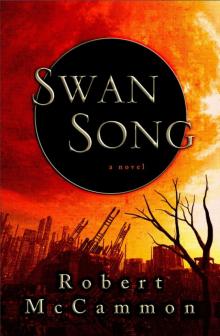 Swan Song
Swan Song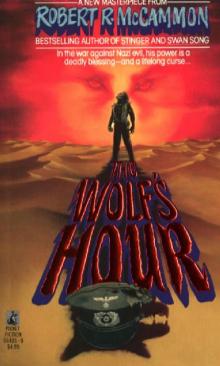 The Wolfs Hour
The Wolfs Hour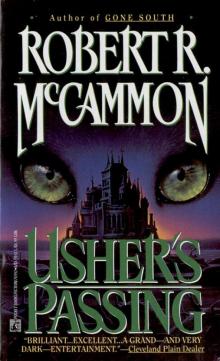 Ushers Passing
Ushers Passing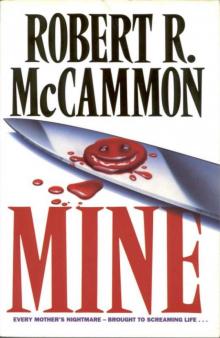 Mine
Mine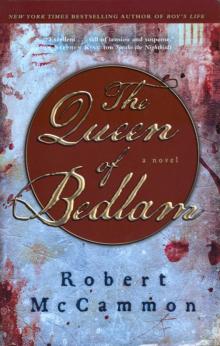 The Queen of Bedlam
The Queen of Bedlam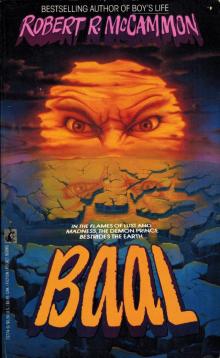 Baal
Baal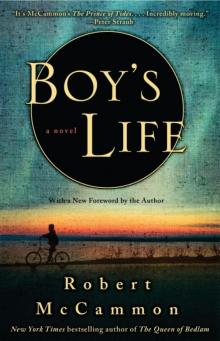 Boys Life
Boys Life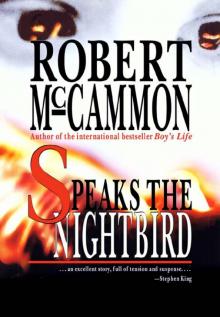 Speaks the Nightbird
Speaks the Nightbird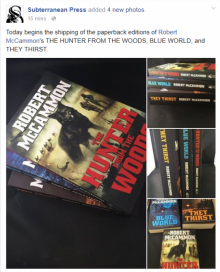 The Hunter from the Woods
The Hunter from the Woods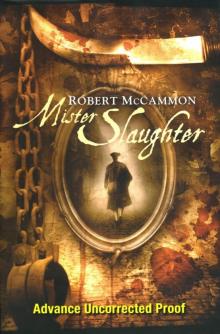 Mister Slaughter
Mister Slaughter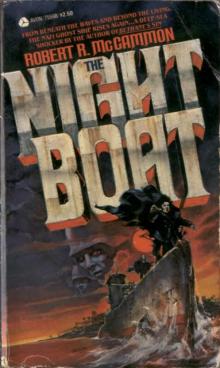 The Night Boat
The Night Boat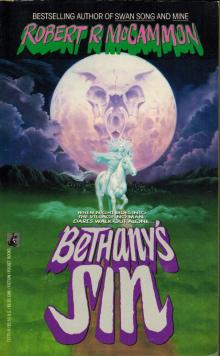 Bethanys Sin
Bethanys Sin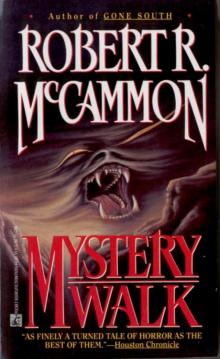 Mystery Walk
Mystery Walk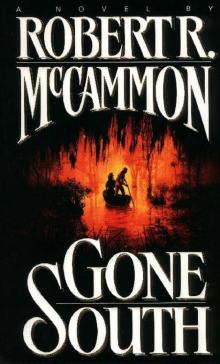 Gone South
Gone South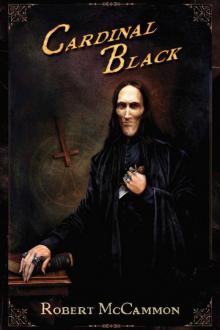 Cardinal Black
Cardinal Black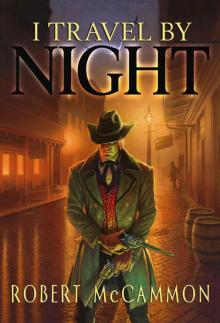 I Travel by Night
I Travel by Night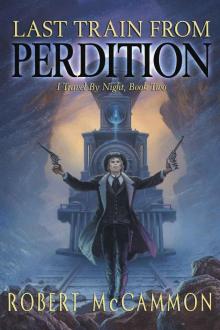 Last Train from Perdition
Last Train from Perdition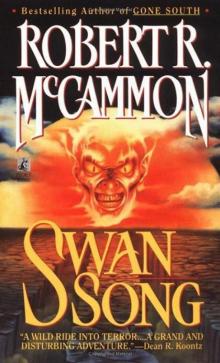 1987 - Swan Song v4
1987 - Swan Song v4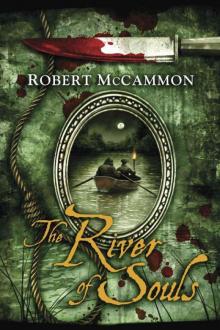 The River of Souls
The River of Souls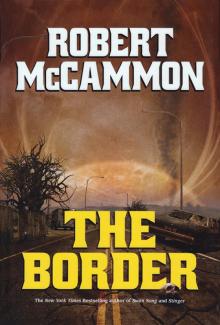 The Border
The Border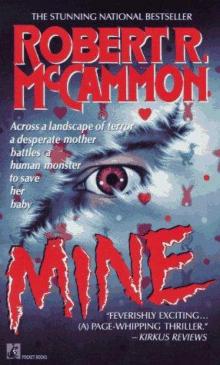 1990 - Mine v4
1990 - Mine v4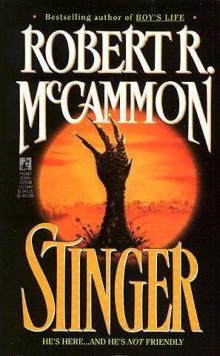 1988 - Stinger
1988 - Stinger The Listener
The Listener